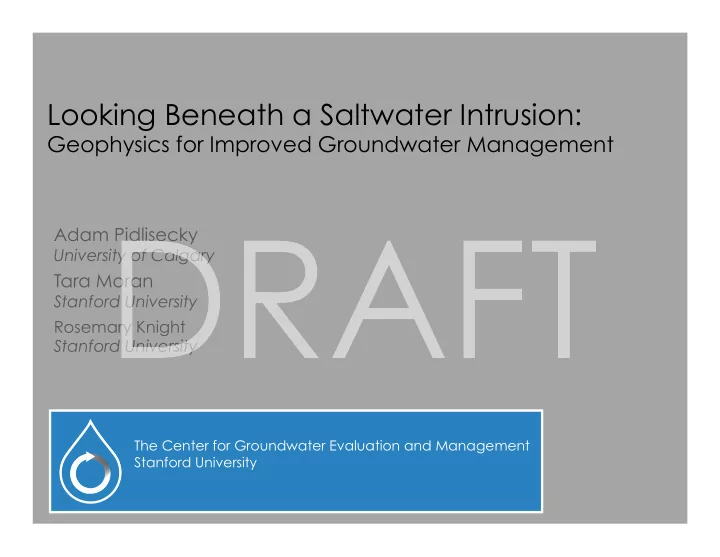

Looking Beneath a Saltwater Intrusion: Geophysics for Improved Groundwater Management DRAFT Adam Pidlisecky University of Calgary Tara Moran Stanford University Rosemary Knight Stanford University The Center for Groundwater Evaluation and Management Stanford University
The Center for Groundwater Evaluation and Management Stanford University DRAFT Goal: To foster integration of new and emerging technologies into local, regional and statewide groundwater management practice. Approach: Partnering with with groundwater management districts throughout the western US to demonstrate the value of these technologies. gemcenter.stanford.edu
DRAFT
Description of Map Symbols ^ Cities 2011 ERT data 2012 ERT data # SBWM well locations DRAFT Cross section Seaside basin boundary Monterey Bay Marina ActiveFault Active Faults Historic (<150 yrs) A' Holocene (<10 ka) Late Quaternary (<750 ka) # SBWM 1 Late Pleistocene (<1.6 ma) # Early Pleistocene (<2.8 ma) SBWM 2 # SBWM 3 Quaternary (Undifferentiated) Fault # SBWM 4 ¹ Pacific Grove A Seaside Kms 0 2.5 5 Monterey Monterey County Data courtesy of the California Geological Survey; Provided by the AZGS
Borehole based monitoring for Saltwater intrusion DRAFT ¤ Sentinel Wells 2007 ¤ 4 monitoring wells drilled to facilitate time-lapse logging of the aquifer to identify saltwater intrusion zones ¤ Wells drilled to ~ 300-400m ¤ Logged seasonally using resistivity logging –WHY ? " ¤ Not really early warning! Once we see it in the well it is there.
A’ A DRAFT SALINAS BASIN SEASIDE BASIN Cross-bedded sand SBWM #4 SBWM #1 SBWM #3 SBWM #2 N Well-graded sand Clay 20 0 DUNE SAND AQUIFER Depth (m) -20 PASO ROBLES AQUIFER -40 AROMAS SAND AQUIFER -60 PASO ROBLES AQUIFER -80 modified after Feeney 2009
Why resistivity ? • Electrical Resistivity Tomography (ERT) • Well documented for small-scale water DRAFT resource applications • Currently used in petroleum applications – this has lead to advancement in field systems and processing approaches • Non-invasive, fast deployment, continuous data • 2D, 3D, and 4D imaging is possible
What You’re Measuring: Resistivity (Ohm-m) ¤ Resistivity is a function DRAFT of the bulk electrical properties and is sensitive to: ¤ porosity ¤ connectivity of pore fluid ¤ pore fluid chemistry ¤ lithology
Pore fluid chemistry: Salinity DRAFT Conductivity (S/m) ¡ Resistivity (Ohm-m) ¡ Concentration (g/L) ¡ 0.03 ¡ 0.006 ¡ 156 ¡ Freshwater 0.1 ¡ 0.02 ¡ 48 ¡ 0.3 ¡ 0.06 ¡ 16 ¡ 1 ¡ 0.2 ¡ 5 ¡ 3 ¡ 0.6 ¡ 2 ¡ 10 ¡ 1.8 ¡ 1 ¡ Saltwater
Concept of Operation Current Source Current Meter DRAFT Volt Meter C2 C1 P1 P2 ρ w
• We use multiple sensors (electrodes) to make 10’s of thousands measurements • Each measurement samples a different volume of earth • A typical array length for this work will be ~ 1km, and will be shifted in DRAFT 200m increments
Geophysical Tomography Like medical DRAFT tomography, but with much poorer resolution http://www.ablesw.com
Geophysical Tomography DRAFT data (d)
Data acquisition/ Processing Two field campaigns: ¤ July 2011 DRAFT ¤ October 2012 ¤ Total field days ~10 Total survey length: 6.8km Total number of data acquired: 130,000 Spatial resolution of inversion mesh: x: 10m, z: 5 à 10m Acquisition Cost: $60,000
DRAFT
DRAFT
N DRAFT ~8.5km ~8 5km
DRAFT ~9km
DRAFT
DRAFT
DRAFT
DRAFT
Conclusions ¤ Effective non-invasive subsurface imaging ¤ Improved large-scale understanding of aquifers DRAFT ¤ Improved operational modeling ¤ Optimized remediation or interventions ¤ Lower cost and environmental impact ¤ Potential for long-term, spatially exhaustive monitoring
Acknowledgments DRAFT ¤ Brad Hansen, Curtis Ferguson, Andrew Parsekian, Jan Walbrecker, Nick Odlum, Jackie Randell ¤ Stephen Bachman at California State Parks- Monterey Division ¤ Tim Jensen at Monterey Peninsula Regional Parks ¤ Ben Mirus and Kim Perkins, USGS
Recommend
More recommend